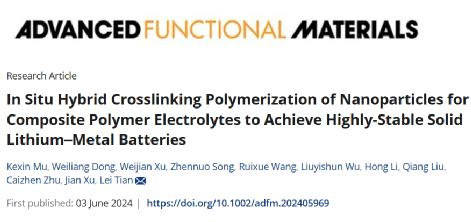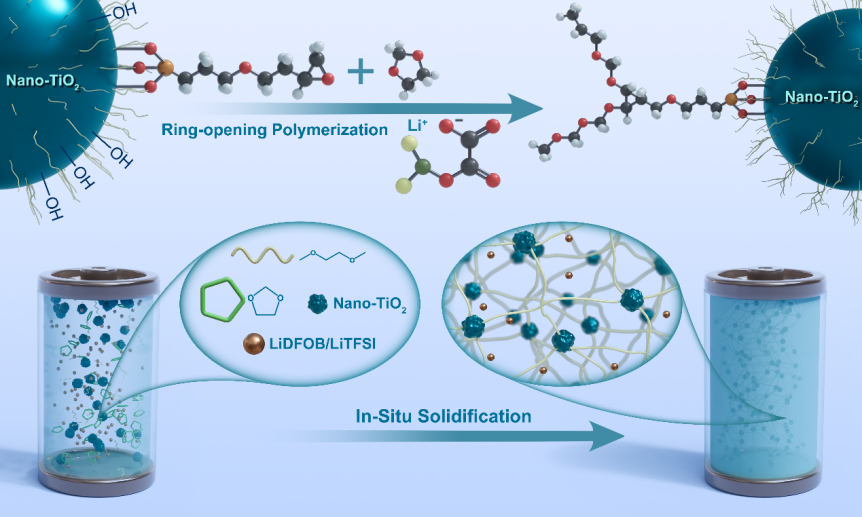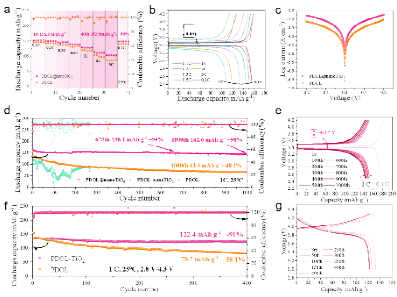Recently, Associate Professor Lei Tian, Professor Caizhen Zhu and Professor Jian Xu’s team from the College of Chemistry and Environmental Engineering at Shenzhen University published the latest research progresses about high-performance solid-state lithium metal batteries on journal Advanced Functional Materials.

The composite solid electrolyte, which combines the advantages of inorganic conductors and organic polymer electrolytes, has become a crucial strategy for the construction of solid-state batteries. However, the physical deposition and agglomeration of traditional composite fillers seriously affect their structural uniformity and ion transport performance, and the construction of uniform and stable composite electrolytes is still an insurmountable challenge.

Figure 1. Design and fabrication of nanoparticle hybrid crosslinked composite polymer electrolyte via in situ solidification. Schematic diagram of in situ polymerization design of nanoparticle hybrid crosslinked solid polymer electrolyte.
Herein, a strategy of in-situ hybrid crosslinking polymerization of TiO2 nanoparticles is proposed for highly stable polymer composite electrolytes (NHCPE) with a ultrahigh ionic conductivity of 1.74 × 10-3 S cm-1 at 25℃, and a high lithium ion transference number of 0.725. These properties enable the composed lithium symmetric battery to be stably deposited/plating off at 0.5 mA cm-2 for more than 1000 h. Moreover, the assembled LFP|PDOL@nanoTiO2|Li battery exhibits a superior specific discharge capacity of 142.6 mAh g-1 at 1 C and 25℃, and a ultrahigh capacity retention rate of 90% after 1000 cycles. The proposed PDOL@nanoTiO2 NHCPE greatly inhibits the defects of easy agglomeration of composite electrolytes, solves the problems of easy decomposition, low thermal stability and poor safety of polyether electrolytes, and opens up a new way for the design and industrial application of high-stability composite polymer electrolytes.

Figure 2. Application of PDOL@nanoTiO2 electrolyte in lithium metal battery
The research article " In Situ Hybrid Crosslinking Polymerization of Nanoparticles for Composite Polymer Electrolytes to Achieve Highly-Stable Solid Lithium–Metal Batteries" is published in Advanced Functional Materials (Impact factor 19.0, JCR Region 1, Top Journal),authored by Master's student Kexin Mu is the first author of this paper. Associate Professor Lei Tian is the corresponding authors of this paper. The corresponding unit is the School of Chemical and Environmental Engineering, Shenzhen University.
The authors are grateful for the support from the National Natural Science Foundation of China (No. 22001175), Shenzhen Science and Technology Major Project (KJZD20231023095359001) and Shenzhen Science and Technology Program (JCYJ20210324095412035, 20220808121346001), the Program for Guangdong Introducing Innovative and Entrepreneurial Teams (2019ZT08C642), Guangdong Basic and Applied Basic Research Foundation (2023A1515010045), and sponsored by CNPC Innovation Fund (2022DQ02-0401).
Article details
Kexin Mu, Weiliang Dong, Weijian Xu, Zhennuo Song, Ruixue Wang, Liuyishun Wu, Hong Li, Qiang Liu, Caizhen Zhu, Jian Xu, and Lei Tian*, In Situ Hybrid Crosslinking Polymerization of Nanoparticles for Composite Polymer Electrolytes to Achieve Highly-Stable Solid Lithium–Metal Batteries. Adv. Funct. Mater. 2024, 2405969
https://doi.org/10.1002/adfm.202405969
Introduction and recruitment of corresponding authors
Tian Lei, associate professor of Shenzhen University, Shenzhen overseas high-level talents. He is currently on the editorial board of Polymer Bulletin. Mainly engaged in functional polymer materials synthesis methodology and application research, including polymer design synthesis, wide temperature range high conductivity solid polymer electrolyte, high safety and high energy density solid polymer battery, and high strength, high toughness and soft materials design preparation and application, hosted or participated in the National Natural Foundation, provincial and municipal key projects, etc. He has published many academic papers in internationally renowned journals such as Advanced materials, Angew.Chem.Int.Ed., Advanced functional materials, Macromolecules, etc. The team recruits postdoctoral/research assistants on a permanent basis. Research interests include but are not limited to polymer synthesis, solid polymer electrolytes, computational chemistry, etc.
